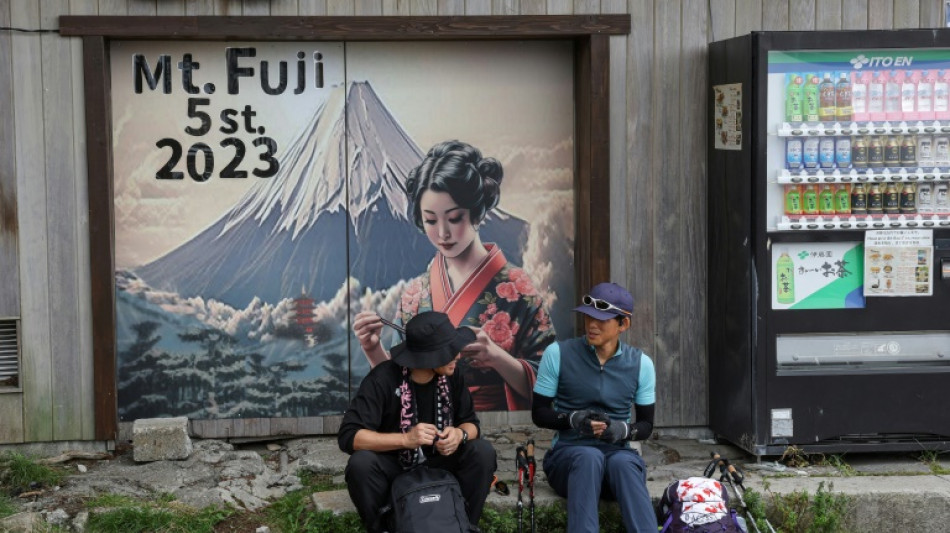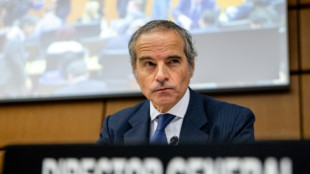
-
 US Justice Dept releasing new batch of Epstein files
US Justice Dept releasing new batch of Epstein files
-
South Africa and Israel expel envoys in deepening feud

-
 French eyewear maker in spotlight after presidential showing
French eyewear maker in spotlight after presidential showing
-
Olympic dream 'not over', Vonn says after crash

-
 Brazil's Lula discharged after cataract surgery
Brazil's Lula discharged after cataract surgery
-
US Senate races to limit shutdown fallout as Trump-backed deal stalls

-
 'He probably would've survived': Iran targeting hospitals in crackdown
'He probably would've survived': Iran targeting hospitals in crackdown
-
Djokovic stuns Sinner to set up Australian Open final with Alcaraz

-
 Mateta omitted from Palace squad to face Forest
Mateta omitted from Palace squad to face Forest
-
Djokovic 'pushed to the limit' in stunning late-night Sinner upset

-
 Tunisia's famed blue-and-white village threatened after record rains
Tunisia's famed blue-and-white village threatened after record rains
-
Top EU official voices 'shock' at Minneapolis violence

-
 Kremlin says agreed to halt strikes on Kyiv until Sunday
Kremlin says agreed to halt strikes on Kyiv until Sunday
-
Carrick calls for calm after flying start to Man Utd reign

-
 Djokovic to meet Alcaraz in Melbourne final after five-set marathon
Djokovic to meet Alcaraz in Melbourne final after five-set marathon
-
Italian officials to testify in trial over deadly migrant shipwreck

-
 Iran says defence capabilities 'never' up for negotiation
Iran says defence capabilities 'never' up for negotiation
-
UN appeals for more support for flood-hit Mozambicans

-
 Lijnders urges Man City to pile pressure on Arsenal in title race
Lijnders urges Man City to pile pressure on Arsenal in title race
-
Fulham sign Man City winger Oscar Bobb

-
 Strasbourg's Argentine striker Panichelli sets sights on PSG, World Cup
Strasbourg's Argentine striker Panichelli sets sights on PSG, World Cup
-
Jesus 'made love': Colombian president irks Christians with steamy claim

-
 IAEA board meets over Ukraine nuclear safety concerns
IAEA board meets over Ukraine nuclear safety concerns
-
Eurozone growth beats 2025 forecasts despite Trump woes

-
 Dutch PM-elect Jetten says not yet time to talk to Putin
Dutch PM-elect Jetten says not yet time to talk to Putin
-
Social media fuels surge in UK men seeking testosterone jabs

-
 Forest face Fenerbahce, Celtic draw Stuttgart in Europa League play-offs
Forest face Fenerbahce, Celtic draw Stuttgart in Europa League play-offs
-
US speed queen Vonn crashes at Crans-Montana, one week before Olympics

-
 Trump nominates former US Fed official as next central bank chief
Trump nominates former US Fed official as next central bank chief
-
New Dutch government pledges ongoing Ukraine support

-
 Newcastle still coping with fallout from Isak exit, says Howe
Newcastle still coping with fallout from Isak exit, says Howe
-
Chad, France eye economic cooperation as they reset strained ties

-
 Real Madrid to play Benfica, PSG face Monaco in Champions League play-offs
Real Madrid to play Benfica, PSG face Monaco in Champions League play-offs
-
Everton winger Grealish set to miss rest of season in World Cup blow

-
 Trump brands Minneapolis nurse killed by federal agents an 'agitator'
Trump brands Minneapolis nurse killed by federal agents an 'agitator'
-
Arteta focuses on the positives despite Arsenal stumble

-
 Fijian Drua sign France international back Vakatawa
Fijian Drua sign France international back Vakatawa
-
Kevin Warsh, a former Fed 'hawk' now in tune with Trump

-
 Zverev rails at Alcaraz timeout in 'one of the best battles ever'
Zverev rails at Alcaraz timeout in 'one of the best battles ever'
-
Turkey leads Iran diplomatic push as Trump softens strike threat

-
 Zelensky backs energy ceasefire, Russia bombs Ukraine despite Trump intervention
Zelensky backs energy ceasefire, Russia bombs Ukraine despite Trump intervention
-
'Superman' Li Ka-shing, Hong Kong billionaire behind Panama ports deal

-
 Skiing great Lindsey Vonn crashes at Crans-Montana, one week before Olympics
Skiing great Lindsey Vonn crashes at Crans-Montana, one week before Olympics
-
Slot warns Liverpool 'can't afford mistakes' in top-four scrap

-
 Paris show by late Martin Parr views his photos through political lens
Paris show by late Martin Parr views his photos through political lens
-
Artist chains up thrashing robot dog to expose AI fears

-
 Alcaraz outlasts Zverev in epic to reach maiden Australian Open final
Alcaraz outlasts Zverev in epic to reach maiden Australian Open final
-
French PM forces final budget through parliament

-
 French-Nigerian artists team up to craft future hits
French-Nigerian artists team up to craft future hits
-
Dutch watchdog launches Roblox probe over 'risks to children'


Japan's Mount Fuji 'screaming' from too many tourists
With its millions of visitors every year and the buses, supply trucks, noodle shops and fridge magnets, Japan's Mount Fuji is no longer the peaceful pilgrimage site it once was.
Now authorities have had enough, saying the number of hikers trekking up the world-famous volcano -- night and day -- is dangerous and an ecological embarrassment.
"Mount Fuji is screaming," the governor of the local region said last week.
Hailing its religious importance and its inspiration to artists, in 2013 UNESCO added the "internationally recognized icon of Japan" to its World Heritage List.
But as has happened in places such as Bruges in Belgium or Rio de Janeiro's Sugarloaf Mountain, the designation has been both a blessing and a curse.
Visitor numbers more than doubled between 2012 and 2019 to 5.1 million, and that's just for Yamanashi prefecture, the main starting point.
- Day and night -
It's not just during the day that a stream of people trudges through the black volcanic grit on their way up the 3,776-metre (12,388-foot) mountain.
At night, long lines of people -- on their way up to see the sun rise in the morning -- trek upwards with torches on their heads.
The main starting-off point is a car park that can only be reached by taxi or buses that take a couple of hours from Tokyo, around 100 kilometres (60 miles) away.
Greeting visitors is a complex of restaurants and shops selling souvenirs as well as snacks and drinks for walkers before they set off.
They are powered by diesel generators and the thousands of litres of water they use has to be brought up in lorries. Trucks also take all the rubbish down.
"I saw a lot of food waste and empty bottles of drinks lying around the hand-washing area of the toilet," complained Japanese hiker Yuzuki Uemura, 28.
- Dangers -
Masatake Izumi, a local official, said the high numbers of people increased the risk of accidents.
Some people who climb at night "get hypothermia and have to be taken back to first aid stations", he told AFP.
At least one person has died so far this season.
For an optional access fee of 1,000 yen ($6.80), visitors get a booklet in Japanese -- there is a QR code for the English version -- with some dos and don’ts.
But some don't realise how tough the five-to-six-hour climb is to the top, where oxygen levels are lower and where the weather can change quickly.
"It's almost winter up there, it's really cold," Rasyidah Hanan, a 30-year-old hiker from Malaysia, told AFP on her way down.
"People should be filtered a little bit because some people were not ready to climb Mount Fuji. They were like in really light clothes... Some of them really looked sick."
- Crowd control -
As tourist numbers get back to pre-pandemic levels, it's not only Mount Fuji whose returning crowds have authorities worried.
This week government ministers met to discuss measures to tackle what Kenji Hamamoto, a senior Japan Tourism Agency official, called "overcrowding and breaches of etiquette" across heavily touristed sites.
For Mount Fuji, authorities announced last month that they would impose crowd control measures for the first time if paths got too busy.
The announcement alone had an effect and in the end no such measures were taken, Izumi said.
Visitor numbers are expected to be down slightly this year from 2019, but in 2024 they could rise again as tourists -- particularly from China -- return.
Yamanashi's governor Kotaro Nagasaki said last week Japan needed to take measures to ensure Mount Fuji did not lose its UNESCO designation.
One solution, he said, could be constructing a light rail system to replace the main road leading to the main starting point for hikers.
"We firmly believe that with regard to Mount Fuji tourism, a shift from a quantity approach to a quality one is essential," Nagasaki said.
"I think that Mount Fuji is one of the things that makes Japan proud," said Marina Someya, 28, a Japanese hiker.
"There are a lot of people, and lots of foreigners."
S.Spengler--VB



